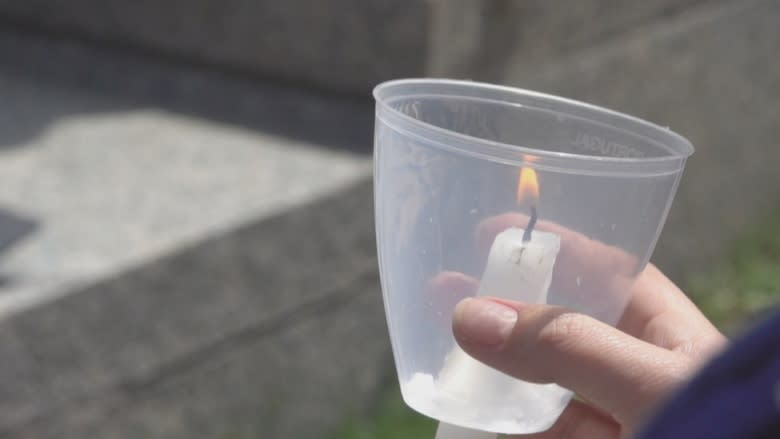'This is a societal issue': victims of transgender violence remembered

It was six years ago that Reid Lodge realized he was transgender.
He came to St. Thomas University in Fredericton and met a transgender person. Suddenly, Lodge felt different about his body and identity.
"I found there was a word to describe the feelings I was having," he said.
And while he said his experience coming out to his family and friends has been a positive one, it's not like that for everyone.
According to the Trans PULSE project, in a detailed survey of 433 trans-people done in Ontario in 2013, 77 per cent of them reported they have had suicidal thoughts, and 43 per cent of them had attempted suicide.
Lodge said this is because of the transphobic culture that exists in our society. He said many of his female transgender friends have been attacked or threatened.
"It's social prejudice, I think," said Lodge. "I have had some negative experiences, I've been threatened, I've received death threats, I've had people stalk me."
"I know for a lot of my friends who are trans-women it's actually a lot worse for them. People tend to be more violent toward trans-women."
He said the small vulnerable community faces challenges every day.
Lack of basic health care, lack of education for both police and people within New Brunswick communities.
"Access to pretty much any kind of service for trans-people is pretty low," he said. "There also isn't a lot of education out there for anybody for what being trans means."
Transgender day of remembrance
But for those who have lost their lives, there is a day of remembrance observed every year on Nov. 20.
Lodge started organizing the ceremony in the capital city with Fredericton Gender Minorities about two years ago.
"So typically, the list is full of trans-women of colour, because they are the most vulnerable," he said.
"It's just a time for the community to come together."
And for Jackie Toner, who organized the Transgender Day of Remembrance at the University of New Brunswick on Monday, said this is a moment to stand with those who have died and those who continue to battle for transgender rights.
Names of those who have died will be read out to the crowd in attendance.
"When you do see the name, it's very powerful on how many people have been murdered for who they are and their identity," said Toner.
She said society has made progress but there is a lot more that can be done.
"It's kind of hard to believe that it's still happening," she said.
Dr. Erin Fredericks, a professor at St. Thomas University, said suicide should be included in any data collected on transphobia.
"These [suicide] rates are very high," she said in an email statement.
Fredericks said "this is a societal issue" and hate must be countered in a many ways.
"In our daily interactions, allies must address the transphobia we witness, as seemingly small acts of transphobia, [comments and jokes] are the foundation on which violence takes place," she said.
Fredericks said with the changing climate in the U.S. toward acceptance of transphobic ways, there will be an increase in the rates of violence society sees.
For both Fredericks and Lodge, finding and creating a safe space and connecting with a supportive community is key to anyone who might find themselves feeling vulnerable.

